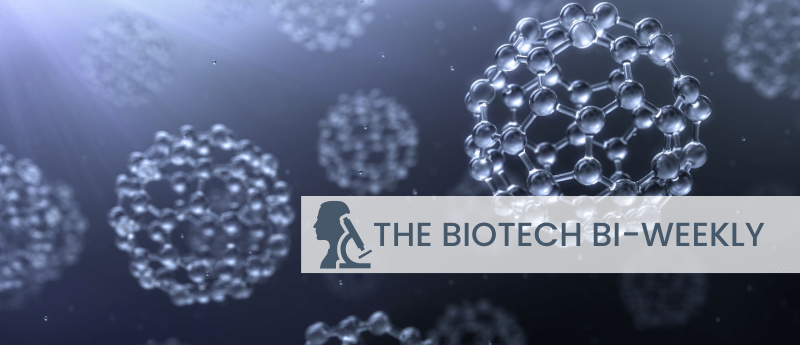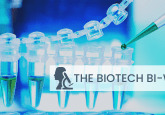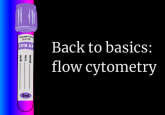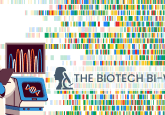The biotech bi-weekly: extracellular vesicles take center stage, the accessibility of sequencing gets another boost and biotech companies release their third-quarter financial results

Check out the latest biotech industry news, from new sequencers and assays for drug optimization to the increasing interest in extracellular vesicles and the finances behind biotech.
Products
Thermo Fisher Scientific introduces nucleic acid delivery solution to advance genetic medicine development
Thermo Fisher Scientific (CA, USA) has released Invitrogen™ Vivofectamine™ Delivery Solutions for the non-viral delivery of nucleic acids for basic research and genetic medicine development applications. These solutions comprise two portfolios: the basic research portfolio with catalog lipid nanoparticle reagents for academic researchers and the drug development portfolio with custom lipid nanoparticle reagents and services for drug developers.
The lipid nanoparticle-based solutions are designed with the intention of improving the targeted delivery of genetic material to specific cells and tissues, while maintaining the integrity of the nucleic acids and reducing the possible side effects associated with viral delivery.
Read more about the solutions here >>>
HiFi sequencing comes to the benchtop
Following on from their recent release of a new chemistry to bring the cost of whole-genome sequencing down to US$500, PacBio (CA, USA) has released a new sequencer that delivers long-read whole-genome sequencing in a more accessible benchtop machine.
The sequencer, VegaTM, costs US$169,000 and provides all the functionality of the Revio system, but with a lower throughput, aiming to make HiFi long-read sequencing more affordable and accessible to a broader range of researchers.
Read the full release here >>>
New assay to screen oral bioavailability of therapeutic candidates
CN Bio (Cambridge, UK) has launched its new PhysioMimix® Bioavailability assay kit: Human 18. The kit is designed to work with the company’s Gut/Liver microphysiological system, a linked Liver-on-a-chip and jejunum model, that can be used to replicate key characteristics of the pathways that determine oral bioavailability.
Commenting on the utility of the new model, CN Bio’s Lead Scientist Yassen Abbas stated that: “Human bioavailability is a crucial part of choosing which drug candidates to progress to the clinic, but an area that is notoriously poorly served by existing models. The PhysioMimix Bioavailability assay kit: Human 18 effectively tackles this issue, providing up to 18 replicates for our customers to profile their drug candidates in vitro, minimizing risk and maximizing the chance of clinical success. The kit modernizes workflows by removing the burden of assay development and validation, so researchers can rapidly onboard an OOC approach.”
Read the full release here >>>
New microcarriers improve scalability of research-stage cell cultures
Rousselot (Ghent, Belgium), the collagen and gelatin brand of Darling Ingredients (TX, USA), has partnered with microparticle biotech company IamFluidics (Enschede, the Netherlands) to produce a research-grade dissolvable microcarrier for cell culture. Microcarriers are small bead-like structures that sit within a suspension, providing a large surface area for cells to adhere to and grow on; however, they are typically insoluble, presenting challenges for cell harvesting.
The partnership uses IamFluidics’ IN-AIR MICROFLUIDICS™ technology to produce alginate-based microcarriers coated with Rousselot’s denatured collagen. The resulting microcarriers promote attachment and growth, yet they dissolve 15 minutes after cell culture reagents are added, improving cell harvesting efficiency and simplifying handling.
Read the full release here >>>
Subcellular particles now detectable with established cell sorter
Cytek Biosciences (CA, USA) has expanded the capabilities of its Cytek Aurora™ CS system to now include an Enhanced Small Particle (ESP™) Detection Option, making it the first commercially available small particle detector on a cell sorter.
By enabling researchers to conduct downstream analysis of materials as small as 70 nm, such as extracellular vesicles that were previously unable to be sorted, this development provides a new tool with which to interrogate emerging fields.
Read the full release here >>>
 From AI to kazoos: Neuroscience 2024 in review with SfN’s Past President Marina Picciotto
From AI to kazoos: Neuroscience 2024 in review with SfN’s Past President Marina Picciotto
Past President Marina Picciotto shares her picks for the Presidential Special Lectures, discusses learning to play the kazoo alongside thousands of neuroscientists, and bursting the bubble of experimental domains to make connections across disciplines.
Publications and partnerships
Extracellular vesicles (EVs) at the core of European consortium
Mursla Bio (Cambridge, UK), has joined EVEREST, a European consortium funded by Horizon Europe (Tbilisi, Georgia) and set up to advance EV research, innovation and clinical translation for the benefit of patients. Mursla has been selected to help support scaling and commercialization strategy for EV-based disease surveillance and diagnostics
The company’s expertise in EVs comes from their work utilizing EV research to develop a biopsy technology that combines the accuracy and disease sub-typing capabilities of tissue biopsies with the ease of liquid biopsy sample collection, providing a non-invasive intervention with comprehensive biological insights.
Read the full release here >>>
Biotech company publishes foundational research in prestigious journal
Michael Newman, Founder and Chief Scientific Officer of the clinical stage biotech company Indaptus Therapeutics (NY, USA) has had his foundational research on the, “Invention and characterization of a systemically administered, attenuated and killed bacteria-based multiple immune receptor agonist for antitumor immunotherapy,” published in Frontiers in Immunology.
The paper describes the invention and pre-clinical characterization of a novel clinical stage immunotherapy candidate that leverages attenuated, killed and stabilized bacteria to activate multiple immune pathways with a weekly pulse, aimed at creating a comprehensive immune response against tumors. The candidate, known as Decoy20, has demonstrated efficacy in preclinical studies across a variety of tumor types and a limited toxicity profile when compared to many cancer therapeutics.
Read the published paper here >>>
Q3 financial reports released
A series of companies have released their third-quarter financial results for 2024. Leap Therapeutics (MA, USA) reported a net loss of US$18.2 million for the third quarter 2024, compared to US$13.7 million for the same period in 2023. The increase was primarily due to an increase in research and development expenses resulting from the enrolment and expansion of their clinical trial of DKN-01, an anti-DKK1 monoclonal antibody, in combination with standard-of-care bevacizumab and chemotherapy in second-line patients with advanced colorectal cancer.
Read the full release here >>>
REGENXBIO (MD, USA) reported a net loss of US$59.6 million for Q3 2024, compared to a net loss of US$61.9 million for the same period in 2023. This decrease was primarily accounted for by drops in general and administrative expenses due to falling professional services costs and a reduction in research and development costs.
Read the full release here >>>
Kodiak Sciences (CA, USA) registered a net loss of US$43.9 million, compared to a net loss of US$50.0 million for the third quarter of 2023. This reduction was primarily due to a drop in general and administrative expenses and research and development expenses.
Read the full release here >>>
 The 2024 John Maddox Prize winners: standing up for open science and human rights
The 2024 John Maddox Prize winners: standing up for open science and human rights
The John Maddox Prize, named after the former editor of Nature who championed good scientific communication, is awarded to researchers who bravely stand up for sound science in the face of personal or public persecution. Now, the 2024 prizes have been announced!
People
New Chief Medical Officer for ‘disruptive therapeutics’-focused biotech
Medicus Pharma (Toronto, Canada), a biotech company aiming to accelerate the clinical development of disruptive therapeutics, has appointed Faisal Mehmud as its new Chief Medical Officer.
With 20 years of experience as a senior medical executive in clinical development, medical affairs and drug safety, the team at Medicus Pharma believe Faisal will enable the expansion of the company’s drug development pipeline “and foster collaboration with strategic partners to bring to market our novel non-invasive patented dissolvable doxorubicin-containing microneedle array (D-MNA) to treat non melanoma skin cancer, especially basal cell carcinoma.”
Read the full release here >>>
Entrepreneur Partner joins biotech investment firm
MPM BioImpact (MA, USA) has appointed a new Entrepreneur Partner, Michael Ehlers, to guide the company’s investment strategy and to provide support to the companies that receive investment.
MPM BioImpact is a biotechnology investment firm with a mission to create and invest in innovative companies seeking to deliver transformative therapies for conditions with an unmet clinical need.
Read the full release here >>>
Fibroblast–immune interaction biotech expands senior leadership team
Mestag Therapeutics (Cambridge, UK) has expanded its leadership team to include a new Head of Development and General Counsel. The biotech company, which is looking to harness new insights into fibroblast–immune interactions, has welcomed Jan Endell into the Head of Development role and Alison Hood as the new General Counsel.
Endell has 15 years of expertise in drug development and strategic leadership, while Hood previously served as VP & Head of Legal, International at Aimmune Therapeutics (CA, USA), a position she retained following the acquisition of Aimmune by Nestlé Health Science (Lausanne, Switzerland) in 2020.





